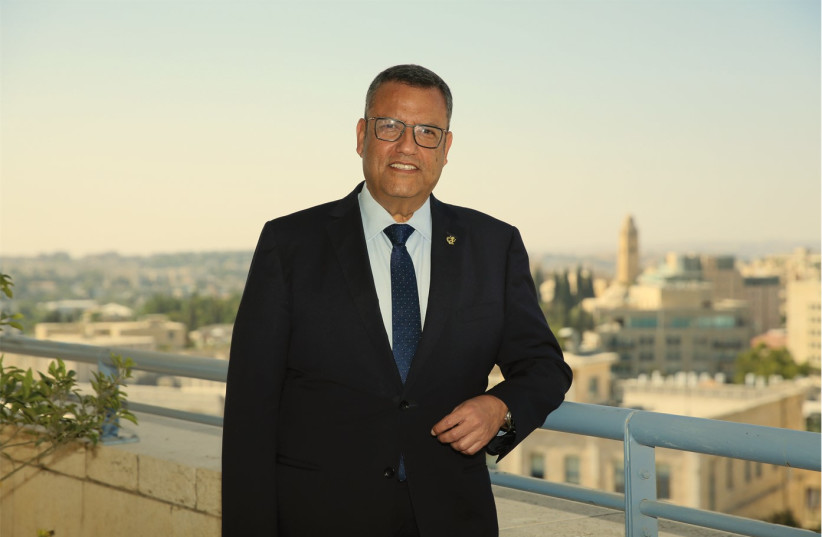Adir Schwartz, 29, was born in Israel to parents who had immigrated to Israel from Scandinavia. He grew up in Talpiot and has resided in Rehavia for the past four years with his wife Shira, whom he met at the Efrata elementary school and at religious scouts.
He has been a member of the city council for about three years. When Hitorerut head Ofer Berkovitch resigned last November, Schwartz became the leader of the list on the city council. Schwartz says that since he was 16, he has been involved in Jerusalem affairs.
“With the exception of the three years I was in the paratroopers, I have devoted my life to my city, Jerusalem,” Schwartz says, in an interview with In Jerusalem.
“With the exception of the three years I was in the paratroopers, I have devoted my life to my city, Jerusalem.”
Adir Schwartz
How did that involvement begin?
After I was released [from the army], I realized that my home was in danger; there was more tension, and the city looked more neglected. I found [people] less willing to protect it as the best city in the world. I had to do something, I couldn’t sit on the sidelines. That’s why I entered politics here. For me, it’s a great privilege.
What are your major goals for this term?
In this term, my main goal is to stop emigration from Jerusalem and keep young people from leaving, and their parents from leaving after them. Therefore, from my first day on this council, I have worked to preserve the character of the neighborhoods.

I prevented the establishment of an extreme ultra-Orthodox yeshiva, Peleg Yerushalmi, from opening in Baka; I prevented the closing of kindergartens and more. I fought, and still fight, against the radicalization that grew here under the auspices of the city council in some neighborhoods.
I am fighting for culture, for jobs in the city, for our life here. I work for a proper administrator and the purity of morals to maintain the public coffers – in order for the money we pay to the municipality to be returned to us. I do all this as a member of the audit committee of the city council, of which I am the chairman.
How do you assess Hitorerut’s impact on the city?
The Hitorerut movement has made inroads since it was founded in 2008 as a youth movement. Today it has become the most significant local political movement in Jerusalem.
We entered the arena to create a Zionist, productive and tolerant Jerusalem because we believe these are the conditions that will make young people stay here. We have led struggles in the field of culture, in Mahaneh Yehuda, and many more, but we have only just begun to dream.
This is a very big challenge. There is still much to be done, especially in the areas of housing and employment. Tolerance is still a distant dream. The situation today is unequivocally better than the day when we entered the field, although in recent years it has become more difficult when we see Lady Davis, a secular school in the heart of Kiryat Hayovel, transferred to haredi hands; when swimming pools are closed on Shabbat and more. We operate, even as millions of shekels fund political conferences of haredi parties.
What is needed for a better Jerusalem?
A strategy is needed, a vision that looks ahead to the future that will outline how to make this city attractive. In the end, clean sidewalks are really important, but that’s not what will keep anyone in this city; no one will stay here because of clean sidewalks or things like that, when there is no vision, no investment in a growth engine.
That’s why the city, which has no significant political power, is racing toward poverty, is unable to sustain itself, and will remain forever dependent on handouts from the government.
These are our main points of disagreement with Mayor Moshe Lion. The data shows that for young ultra-Orthodox people, the main reason for emigration [from the city] is housing. But for young people from other sectors, it is mainly about employment opportunities and quality of life.
In everything related to employment, I give Moshe Lion a failing grade. We are all looking forward to the completion of the works at the entrance to the city, but the fact that offices will be built there does not guarantee that businesses will come in.
The opportunities offered to young Jerusalemites outside the city are much better. The average salary here is half of Tel Aviv’s in every field – hi-tech, accounting, law, everything. Jerusalem is light years behind; until we change this balance, it will not be good to live here.
What are your plans for the next city council, after the October elections?
I have the privilege of leading the revival of a movement that has secular and religious activists, Right and Left, immigrants and Sabras, all together on one front for our common future, in our common home, Jerusalem. This is a rare thing today. You can look at national politics and understand how obvious it is. We are a new generation that takes responsibility, and I am happy that there are many new people involved.
Regarding Moshe Lion: If he is reelected, I promise that my movement and I will do what we can to maximize our ability to influence for the sake of the public that elected us. We will not enter the coalition as an ornament, but we will not remain in the opposition out of principle. Jerusalem is above everything. Always. ❖
